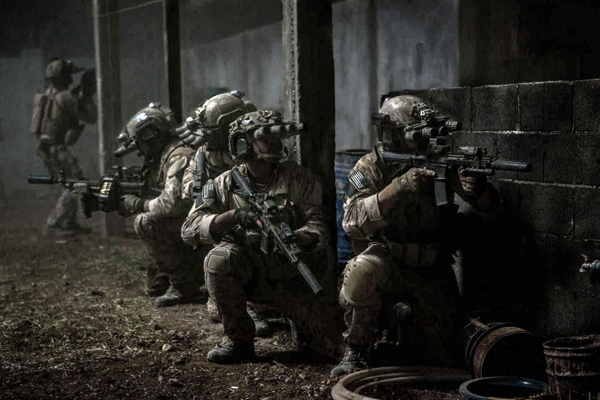Review – Zero Dark Thirty
|
Zero Dark Thirty‘s greatest strength is its moral ambivalence. The story, which the opening title screen informs viewers is based on first-hand accounts from those involved, tells the story of the 10-year hunt for Osama bin Laden. But it never once tells you how to feel about that hunt.
By giving the film a narrow focus, telling it almost strictly through the eyes of one CIA operative in the Middle East, writer Mark Boal and director Kathryn Bigelow avoid the larger moral and political implications of the events depicted. They take a story we are all incredibly familiar with and tell it through the lens of someone instrumental in making it happen, making the whole thing feel smaller and more intimate.
Those larger implications are all there in the periphery, but the film never dwells on them. Instead, you are left to draw your own conclusions about what it all means in the larger scope. Based on your political leanings and personal ideology, what you draw from the film may be very different from what the person sitting next to you takes away. And that is the hallmark of a truly great and memorable film.
Take, for example, the much-discussed torture scenes early in the film. Our protagonist, Maya (Jessica Chastain), is in a room with a captive who has his arms bound by ropes. The captive’s interrogator, Dan (Jason Clarke), over the course of several interrogation sessions, waterboards him, strips him nude in front of Maya, puts him in a dog collar and forces him into a small wooden box. This torture leads to the first information about Osama bin Laden’s courier, the tip that eventually led the CIA to discovering bin Laden’s compound.
Senators Dianne Feinstein, Carl Levin and John McCain have voiced concerns about the scene since, in their minds, it validates torture by showing it leading to usable information. But the film never makes a claim that the torture was necessary. It just depicts it as something that happened. The scenes are disturbingly matter-of-fact. And since other captives, who weren’t tortured, also speak of the same courier later in the film, it’s possible to conclude that the information would have eventually gotten out without resorting to those drastic measures. Again, it’s all a matter of your perspective.
The only discussion Maya has about the larger implications of torture is with Dan later in the film. As he is leaving the Middle East to head back to Langley, he warns Maya that the political climate has changed and that, because of Abu Ghraib, she could find herself in a lot of trouble if she continues to use the old interrogation methods. But Dan doesn’t make a statement about how wrong the American people are for caring or how necessary the torture is. It’s just an acknowledgment that things have changed and a simple warning to a colleague and a friend not to get caught maintaining the status quo.
All of the major moments in the film are handled in a similar matter-of-fact way. The final scene itself, where SEAL Team Six members swarm bin Laden’s compound, could have been exploited to make a big, exciting shootout finale. But even their mission, which is the culmination of 10 years of painstaking investigation, is shown in a straightforward, unglorious manner.
Bigelow makes the viewer feel how they felt on the ground, charged with adrenaline, hyperfocused on the mission and too busy and in too much danger to take much time to focus on the importance of what they are doing. They went into the compound unsure of whether or not bin Laden would even be there. By the time they realized he was, the mission was already over and it was time to get out of there. It wasn’t an epic showdown with an evil supervillain.
Bigelow is a confident filmmaker with a refreshingly patient storytelling style. She lets scenes breathe and never relies on quick edits or frantic pacing to ratchet up the tension or the action. And yet she makes the audience feel exactly what she wants them to feel. Zero Dark Thirty is filled with great moments of suspense, action and heartbreaking despair. The film’s depiction of the 2008 Marriott Hotel bombing in Islamabad is a perfect balance of all three of those elements.
The cast of the film is quite strong as well. Jessica Chastain gives a strong performance as Maya and I can only assume that this is just the beginning of big things for her. Jason Clarke and Kyle Chandler are both incredibly solid in their supporting roles. And the film is filled with a variety of great cameos, including James Gandolfini, Chris Pratt and Mark Strong.
In today’s Hollywood, it’s refreshing to watch a film that is well-paced, well-acted and well-told that never feels preachy or forced. With both Zero Dark Thirty and The Hurt Locker, Kathryn Bigelow is proving that she’s one of the best in the business. Watch Zero Dark Thirty and let the story wash over you. What you end up taking away from it is entirely up to you. And that’s the brilliance of it.
Written by Joel Murphy. If you enjoy his reviews, he also writes a weekly pop culture column called Murphy’s Law, which you can find here. You can contact Joel at murphyslaw@hobotrashcan.com.




